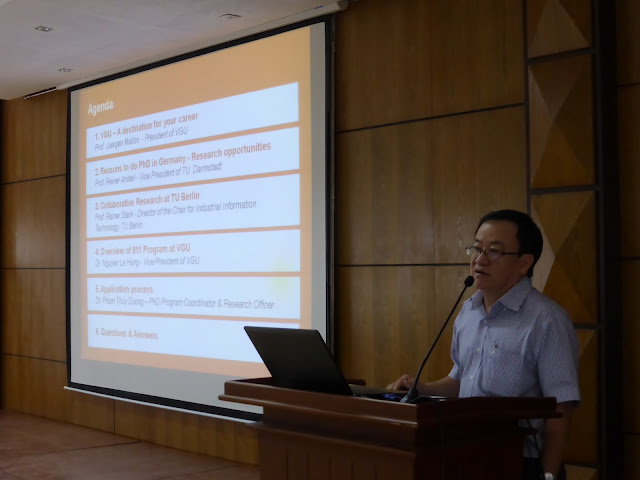On 19 September 2015, at MOET Building in HCMC, we organized the Info Session on the PhD Scholarships in Germany - Training for VGU's Future Lecturers, funded by State Budget.
The
911 Program provides full-time PhD scholarships in Germany for
candidates who would like to become VGU’s future’s lecturers. The
scholarships cover all fees relating to the courses, living costs,
health insurance, travel cost, passport and visa fees, and one return
air ticket.
At the event, President of VGU, Prof. Juergen Mallon gave an introduction on VGU as the 1st New Model University project in Vietnam focusing sustainable high-tech engineering, a joint project of Vietnam & Germany with research oriented education and academic support from 36 German universities. The President also expressed the benefits of being a lecturer at VGU and the need of 120 lectures in the future of VGU, where it would be planned for 5000 students with 23 study programs.
We were lucky to have two special guests from Germany at the Infosession, thanks to their visits for the GCSM conference, Prof. Reiner Anderl and Prof. Rainer Stark. Prof. Reiner Anderl, Vice President of TU Darmstadt and Chairman of the VGU Consortium presented about reasons to do PhD in Germany and research opportunities through collaborative research centers, graduate school projects and research clusters. He also emphasized the German procedure for achieving a Doctoral graduation, which are to provide scientific research self responsibly, to prove the ability of performing self-dependent research, to develop the ability to defend the own scientific results achieved. Prof. Rainer Stark, Director of the Chair for Industrial Information Technology from TU Berlin then gave an example of joint research at the Collaborative Research Center in TU Berlin.
An overview on 911 Program at VGU was given by Dr. Nguyen Le Hung, Vice President of VGU. The application process was briefly presented with further instruction document given later by email to the participants (which is also available at VGU’s website).
The Q&A session was quite dynamic. Participants would like to know more about VGU Consortium, the German universities supporting VGU and study programs at these universities.
Following up this event, 3 consultant sessions will be held at VGU campus in HCMC on Saturdays of October 17, November 21 and December 19, 2015) for those interested.
At the event, President of VGU, Prof. Juergen Mallon gave an introduction on VGU as the 1st New Model University project in Vietnam focusing sustainable high-tech engineering, a joint project of Vietnam & Germany with research oriented education and academic support from 36 German universities. The President also expressed the benefits of being a lecturer at VGU and the need of 120 lectures in the future of VGU, where it would be planned for 5000 students with 23 study programs.
We were lucky to have two special guests from Germany at the Infosession, thanks to their visits for the GCSM conference, Prof. Reiner Anderl and Prof. Rainer Stark. Prof. Reiner Anderl, Vice President of TU Darmstadt and Chairman of the VGU Consortium presented about reasons to do PhD in Germany and research opportunities through collaborative research centers, graduate school projects and research clusters. He also emphasized the German procedure for achieving a Doctoral graduation, which are to provide scientific research self responsibly, to prove the ability of performing self-dependent research, to develop the ability to defend the own scientific results achieved. Prof. Rainer Stark, Director of the Chair for Industrial Information Technology from TU Berlin then gave an example of joint research at the Collaborative Research Center in TU Berlin.
An overview on 911 Program at VGU was given by Dr. Nguyen Le Hung, Vice President of VGU. The application process was briefly presented with further instruction document given later by email to the participants (which is also available at VGU’s website).
The Q&A session was quite dynamic. Participants would like to know more about VGU Consortium, the German universities supporting VGU and study programs at these universities.
Following up this event, 3 consultant sessions will be held at VGU campus in HCMC on Saturdays of October 17, November 21 and December 19, 2015) for those interested.
Based on the current and future Academic Planning, VGU recruits PhD candidates in these following fields:
- Architect
- Environmental & Process Engineering
- Industrial Engineering & Technology Management
- Health Management
- IT Security
- Electrical Engineering & IT
- Computer Science
- Mechatronics & Sensor Systems
- Mechanical Engineering
- Computational Engineering
- Civil Engineering
- Global Production Engineering and Management
- Sustainable Urban Development
- Traffic, Transport and Logistics
- Finance & Accounting
- Business Administration
- Economics
- Business Information Systems
http://www.vgu.edu.vn/fileadmin/pictures/studies/20150810-VGU911PhDScholarship2015_VN.docx
Following are all the presentations on the Info Session:
Doctoral Graduation Procedure in Germany by Prof. Reiner Anderl - VGU Consortium Chairman and Vice President of TU Darmstadt
The Collaborative Research Center at TU Berlin by Prof. Rainer Stark - Director of the Chair for Industrial Information Technology, TU Berlin











